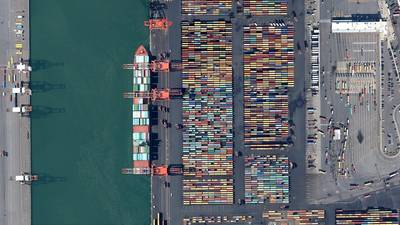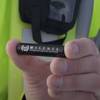US Port Strike Leaves Huge Cargo Backlog In Its Wake
U.S. East Coast and Gulf Coast ports began reopening late on Thursday after dockworkers and port operators reached a wage deal to settle the industry's biggest work stoppage in nearly half a century, but clearing the cargo backlog will take time.
The strike ended sooner than investors had expected, weakening shipping stocks across Asia on Friday as freight rates were no longer expected to surge.
At least 54 container ships queued outside the ports as the strike had prevented unloading and threatened shortages of anything from bananas to auto parts. Everstream Analytics was calculated the number queuing at 4:00 p.m. ET (2000 GMT). More ships are sure to arrive.
Pricing platform Xeneta said it was likely to take two to three weeks for the normal flow of goods to be reestablished.
"Remember that ships keep calling, so it's not just a matter of handling the ships already in line, but to work extra hard to run down the congestion before supply chains are re-running," Xeneta Chief Analyst Peter Sand told Reuters.
The International Longshoremen's Association (ILA) workers union and United States Maritime Alliance (USMX) port operators announced the deal late on Thursday. Sources said they had agreed a wage hike of around 62% over six years, raising average wages to about $63 an hour from $39 an hour.
Shares in shipping companies in Asia and Europe fell.
"Shipping stocks had previously rallied on expectations of price increases triggered by the strike by U.S. dock workers and the tense situation in the Middle East," said Taishin Securities Investment Advisory analyst Tony Huang.
In Europe, shipping group A.P. Moeller-Maersk fell 7.7% to the bottom of the STOXX 600, while Hapag-Lloyd was down 12.4% and Switzerland's Kuehne und Nagel was down 1.8%.
Japan's Nippon Yusen, which had hit a record high a day earlier, shed 9% and Kawasaki Kisen fell 9.5%. Mitsui O.S.K. Lines also lost 7% in its busiest trading day for 18 months.
In South Korea, HMM dropped 6.6% to a three-week low and Pan Ocean dropped 5.7%, while Taiwan's Evergreen Marine, Wan Hai Lines and Yang Ming Marine also fell between 8.8% and 10% in their heaviest drops for several months.
In Hong Kong, Orient Overseas (International) was the biggest loser on the Hang Seng index with an 8% drop.
The ILA launched the strike by 45,000 port workers, their first major work stoppage since 1977, on Tuesday, affecting 36 ports from Maine to Texas. JP Morgan analysts estimated the strike would cost the U.S. economy around $5 billion per day.
Retailers account for about half of all container shipping volume, with Walmart, IKEA, and Home Depot among those that rely on the East Coast and Gulf Coast ports, according to eMarketer analyst Sky Canaves.
Bill of lading figures from Import Yeti, a data firm, show the importers reliant on the affected ports include IKEA, Walmart and Goodyear Tire & Rubber.
East Coast ports are also destinations for coffee, whose price has risen because of the disruptions.
Although the tentative deal on wages has ended the strike, the two sides will continue hammering out other issues, such as the ports' use of automation that workers say will lead to job losses.
"The decision to end the current strike and allow the East and Gulf coast ports to reopen is good news for the nation’s economy," the National Retail Federation said in a statement. "The sooner they reach a (final) deal, the better for all American families."
(Reuters - Additional reporting by Jihoon Lee, Emily Chan, Tom Westbrook and Stine Jacobsen; Writing by Peter Henderson; Editing by Sonali Paul and Barbara Lewis)







